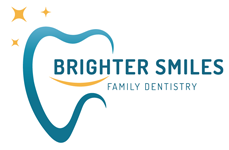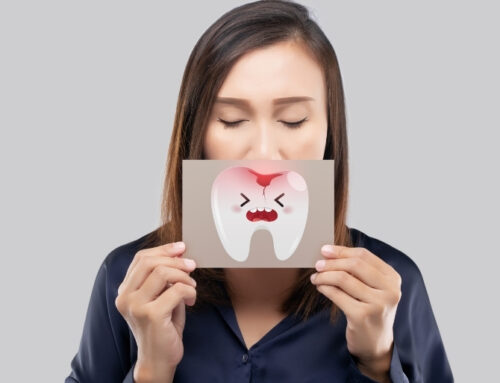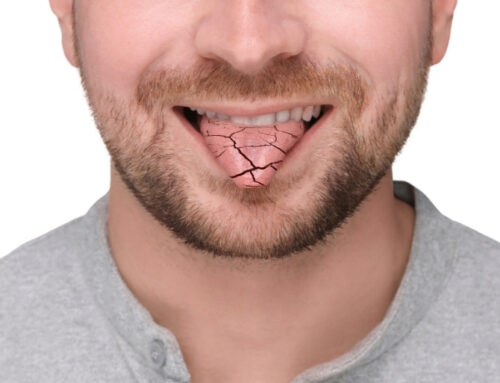Bruxism, often called teeth grinding, is a condition where people unknowingly clench or grind their teeth, whether awake or asleep.
Understanding how to stop bruxism is crucial, as frequent or severe cases can lead to jaw pain, tooth damage, and other complications. This condition can occur during sleep (sleep bruxism) or while awake (awake bruxism).

In this guide, we’ll walk you through the causes of teeth grinding, the signs to watch for, and proven solutions—from simple lifestyle changes to professional treatments available right here in West Des Moines at Brighter Smiles Family Dentistry.
Whether you’re looking for quick relief or long-term prevention, we’ve got you covered.
Quick Steps to Stop Teeth Grinding
If you’re searching for effective ways to address teeth grinding, these three steps can help you protect your teeth and reduce discomfort.
Step 1. Use a Mouth Guard
Wearing a mouth guard is an effective and easy way to protect your teeth from the effects of grinding.
These devices act as a cushion between your upper and lower teeth, reducing the strain on your jaw and protecting your enamel from wear.
Although Brighter Smiles Family Dentistry does not provide mouth guards directly, our dental team can guide you in selecting the right type, including custom-fitted options from reputable providers.
These personalized guards offer superior comfort and protection compared to over-the-counter alternatives.
Step 2. Adjust Lifestyle Habits
Simple adjustments to your daily habits can go a long way in minimizing teeth grinding.
Cutting back on caffeine and alcohol, particularly at night, can relax your muscles and promote better sleep. Quitting smoking can also help, as it reduces tension in your jaw.
By making these small but impactful changes, you can create a healthier environment for your teeth and jaw.
Step 3. Reduce Stress
Since stress is a common culprit of teeth grinding, finding ways to manage it can make a significant difference.
Practicing relaxation methods like meditation, yoga, or deep breathing can ease jaw tension and help you feel more at ease.
If managing stress feels overwhelming, consider reaching out to a local therapist or counselor for support.
Taking care of your mental health is an important step in stopping bruxism and improving your overall well-being.
Understanding Bruxism
To manage bruxism effectively, it’s essential to understand its forms and what causes it.
From lifestyle habits to underlying medical conditions, various factors play a role in teeth grinding. Let’s break it down.
What Is Bruxism?
Bruxism goes beyond the occasional habit of clenching or grinding your teeth—it’s a persistent condition that may require attention. It comes in two main forms:
Bruxism can also be categorized based on its underlying causes:
- 1
Primary Bruxism: This type is not associated with any medical condition and is often influenced by habits or lifestyle.
- 2
Secondary Bruxism: This occurs due to an underlying condition, such as sleep apnea, GERD (acid reflux), or as a side effect of certain medications.
Understanding which type of bruxism you have can help you and your dentist develop the right strategy for management and prevention.
Causes of Teeth Grinding
Bruxism often arises from a combination of lifestyle choices and medical factors. Here’s what commonly contributes to teeth grinding:
If you suspect a medical condition is driving your teeth grinding, seeking professional guidance can provide clarity and help determine the best treatment options.
Symptoms and Effects of Bruxism
Bruxism can be easy to overlook, especially if it occurs while you’re asleep. However, understanding the symptoms and potential consequences of untreated bruxism is crucial for protecting your oral health and overall well-being.
Symptoms of Teeth Grinding
Many people are clueless when they grind their teeth, especially at night. However, there are several signs that can indicate bruxism, including:
- 1
Jaw pain or stiffness, specifically in the morning.
- 2
Headaches, especially around the temples.
- 3
Worn, chipped, or cracked teeth.
- 4
Tooth sensitivity or pain, even without visible damage.
- 5
Tightness or discomfort in the face, neck, or shoulders.
- 6
Clicking or popping sounds in the jaw may point to TMJ issues.
If you notice any of these symptoms, it’s a good idea to consult a dentist for an evaluation. Identifying bruxism early can prevent more serious complications.
Effects of Untreated Bruxism
If left untreated, bruxism can cause a range of long-term issues that may impact both your dental health and overall well-being, such as:
These effects emphasize the importance of addressing bruxism early with appropriate treatments and lifestyle changes to safeguard your oral health and quality of life.
Treatment Options for Bruxism
Managing bruxism is about protecting your smile and improving your quality of life. Here are some effective options to help you stop teeth grinding and prevent further damage.
Professional Treatments
Dental Solutions
When bruxism starts to affect your teeth, professional care can help.
- 1
Bite Correction: Misaligned teeth can worsen grinding. Treatments like orthodontics or minor adjustments may help.
- 2
Custom Mouth Guards: Designed to fit your bite, these devices reduce grinding and protect your teeth. Brighter Smiles Family Dentistry in West Des Moines can recommend trusted providers for the best options.
Medications
In some cases, muscle relaxants or short-term anti-anxiety medications may be recommended to reduce grinding, particularly during sleep. Always consult a professional before use.
At-Home Bruxism Remedies
Jaw Exercises
Simple exercises can ease tension, such as:
Natural Remedies
Combining these treatments can help you take control of bruxism and protect your oral health.
Additional Considerations
While coverage and payment options make dental care affordable, regular checkups and preventive care are essential to keep your gums and teeth strong and healthy as you age.
When to See a Doctor About Teeth Grinding
Teeth grinding might seem harmless at first, but there are clear signs that professional help is needed:
- 1
Persistent jaw pain or discomfort that doesn’t improve with home care.
- 2
Noticeable tooth damage like cracks, chips, or excessive wear.
- 3
Chronic jaw issues such as locking or difficulty opening and closing your mouth.
If you’re experiencing these symptoms, don’t wait. Brighter Smiles Family Dentistry in West Des Moines provides expert evaluations and personalized solutions to address teeth grinding and protect your smile.
Bruxism in Children
Teeth grinding is common in children, often caused by stress, teething, or jaw development. Thankfully, most children grow out of it without any long-term effects.
However, if your child complains of jaw pain, struggles with sleep, or has visible tooth wear, it’s best to consult a dentist.
Brighter Smiles Family Dentistry offers gentle, kid-friendly care to address any concerns and provide peace of mind.

About the Author
Brighter Smiles Family Dentistry, led by Dr. Melani Fulton, upholds a legacy of exceptional dental care in West Des Moines, IA. Dr. Fulton, a University of Iowa College of Dentistry alumna, specializes in family dentistry and orthodontics. She succeeded Dr. Dan Todd in 2021, continuing a tradition of patient-centered, high-quality dentistry. Committed to gentle, modern treatments, Dr. Fulton’s approach is deeply rooted in community values, ensuring every patient feels like family at Brighter Smiles.




